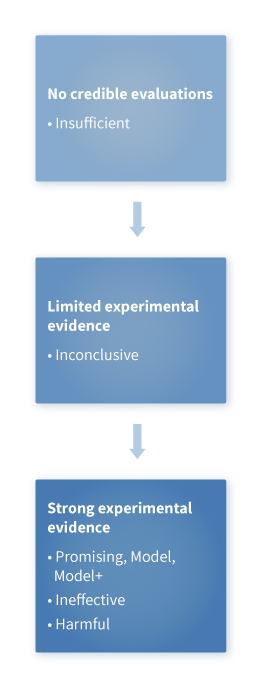
tomtest
Non-Certified Programs
More than 90 percent of interventions we review do not receive Blueprints for Healthy Youth Development certification because they have not met Blueprints criteria. Supported through funding from Arnold Ventures, Blueprints has extended its classification system to provide an evidence rating for interventions that fail to meet Blueprints certification standards.
In addition to rating the certified interventions that meet Blueprints criteria, non-certified interventions are also now rated based on whether they are ineffective, harmful, or lack strong evidence.
- Interventions lacking strong supportive evidence are generally reviewed and rated internally by Blueprints staff.
- However, the advisory board may also conclude an intervention they have reviewed lacked sufficient evidence for certification despite having made it through the internal review process.
The rating for non-certified interventions is on a continuum. All interventions in our database are provided a rating based on the classification system below.


Rating system for non-certified interventions
Rating system for non-certified interventions
Several interventions meet Blueprints standards for intervention specificity, impact and evaluation quality but fail to meet the dissemination readiness standard necessary for Blueprints certification. If most or none of the criteria are not met by an intervention, that intervention will receive a “not dissemination ready” rating, meaning it has met criteria for evaluation quality (as determined by the Blueprints advisory board) but has not yet met the dissemination readiness criteria. Below you will find the various classifications for how Blueprints rates non-certified interventions.
- Not Dissemination Ready
Has met criteria for evaluation quality ( as determined by advisory board ) but has not yet met the “dissemination readiness” criteria. several interventions meet Blueprints standards for intervention specificity, impact and evaluation quality but fail to meet the dissemination readiness standard necessary for Blueprints certification.
- Inconclusive Evidence
This rating is given to programs for which there is only one quasi-experimental study the meets Blueprints evaluation quality standards (Blueprints certification requires one randomized control trial or two quasi-experimental design studies that meet Blueprints evaluation quality standards).
- Insufficient Evidence
Studies of the program have substantial limitations related to the evaluation design, measurement, or analysis. Studies of a program rated as insufficient may have one or more limitations and may also include the same factor as inconclusive evidence.
- Ineffective
The evidence for this intervention meets all Blueprints evaluation quality standards but finds null (i.e., nonsignificant) effects on Blueprints outcomes.
- Harmful
Studies of the program meet all Blueprints evaluation criteria but find significant harmful effects on a Blueprints behavioral outcome.